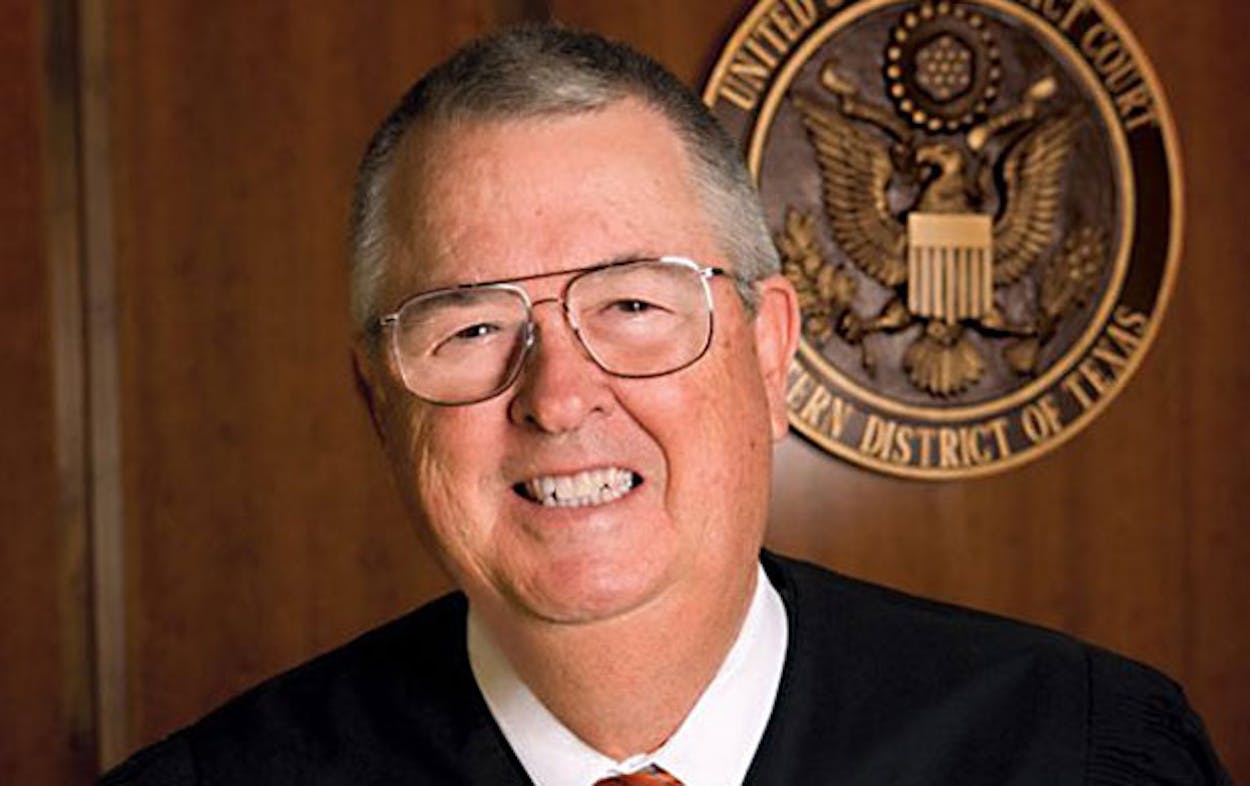(Updated at end)
Lance Armstrong’s eighty-page request for a restraining order to prevent the United States Anti-Doping Agency from continuing its formal investigation of him ran into the wrong officiant on Monday: famously impatient, frequently hilarious U.S. District Judge Sam Sparks, who loves to rebuke lawyers for their inaccurate, unnecessary, or too-wordy filings.
Sparks’s unique orders have included last summer’s “kindergarten party” in which he promised attorneys “an advanced seminar on not wasting the time of a busy federal judge and his staff because you are unable to practice law at the level of a first year law-student.”
He also “benchslapped” lawyers who were trying to intervene in the Texas sonogram law case, as TEXAS MONTHLY’s Paul Burka noted at the time.
Zinging Armstrong’s “desire for publicity, self-aggrandizement,or vilification of Defendants” with the righteousness of a sports talk-radio host, Sparks wrote that Armstrong’s filing should have been:
a short and plain statement of detailed facts, not a mechanical recital of boilerplate allegations, nor — as is more relevant here — a lengthy and bitter polemic against the named defendants.
Armstrong’s complaint is far from short, spanning eighty pages and containing 261 numbered paragraphs, many of which have multiple subparts. Worse, the bulk of these paragraphs contain “allegations” that are wholly irrelevant to Armstrong’s claims and which, the Court must presume, were included solely to increase media coverage of this case, and to incite public opinion against Defendants.
This Court is not inclined to indulge Armstrong’s desire for publicity, self-aggrandizement, or vilification of Defendants, by sifting through eighty mostly unnecessary pages in search of the few kernels of factual material relevant to his claims.
In a footnote, Sparks added:
Contrary to Armstrong’s apparent belief, pleadings filed in the United States District Courts are not press releases, internet blogs, or pieces of investigative journalism. All parties, and their lawyers, are expected to comply with the rules of this Court, and face potential sanctions if they do not.
Sparks dismissed the complaint “without prejudice,” meaning he wasn’t ruling on its merits, and that Armstrong and his attorney can re-file an amended complaint within twenty days.
“It was too long and it contained unnecessary factual content,” Armstrong lawyer Tim Herman conceded in an interview with the Austin American-Statesman‘s Suzanne Halliburton. “When Judge Sparks speaks, I listen.”
Herman said the suit could be re-filed as early as today.
Juliet Macur of the New York Times explained the current timetable of the USADA’s inquiry:
[Armstrong] has until Saturday afternoon to either accept or reject a sanction from the agency that his court filing said runs a “kangaroo court.”
If he rejects the penalty, his case will proceed to an independent three-person arbitration panel, which his lawsuit called “an arbitration regime” that the antidoping agency “has populated with arbitrators who predictably find in USADA’s favor.”
That hearing is mandated by the Ted Stevens Olympic and Amateur Sports Act, which includes a due process checklist that delineates athletes’ procedural rights. Any appeals of the arbitrators’ decision would be heard by the Court of Arbitration for Sport, the sport’s highest authority, and that decision would be final.
Two legal experts told ESPN’s Bonnie Ford that if Armstrong had any chance at relief in the court system, it would likely come after USADA’s arbitration process, not before.
UPDATE: Armstrong’s lawyers did indeed refile the suit on Tuesday, with the complaint coming in, as Amy Shipley of the Washington Post reported, at a mere 25 pages this time.
Also on Tuesday, three former Armstrong associates who are part of the same USADA inquiry — two doctors and a trainer, all of whom worked with Armstrong’s U.S. Postal Service and Discovery Channel teams — accepted lifetime competition bans, opting not to pursue arbitration.
USADA Chief Executive Officer Travis Tygart told Shipley none of them confessed to any role in doping.
Below, Sparks order, followed by Armstrong’s original lawsuit.







